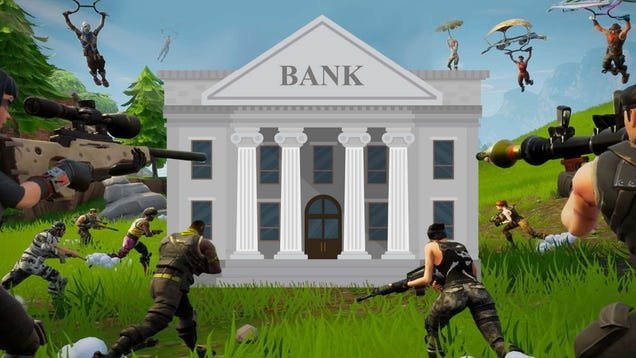Online Games Act Like Unregulated Banks, And The US Gov’t Has Noticed

A new report from the United States Consumer Financial Protection Bureau (CFPB)—an organization focused on enforcing the laws that protect consumers—indicates the bureau is aware of and monitoring big online video games that are filled with in-app purchases, digital currencies, and shady third-party markets that turn these games into pseudo-banks and casinos for kids.
The Top 10 Most-Played Games On Steam Deck: October 2023 Edition
For years now, online video games have featured microtransactions, in-game currencies, digital asset trading, and even sometimes the ability to “cash out” your earnings. And as these games—like Fortnite, Roblox, and League of Legends—have started to bring in millions and millions of dollars, it’s led to publishers investing more and more into payment processors and other financial services. All of this seems more like a bank than a video game, yet these companies and games don’t have to play by the same rules as financial institutions. And this is something the U.S. government has noticed.
The CFPB’s new video game industry report
On April 4, the CFPB published a lengthy new report about banking inside virtual worlds and video games. While the report doesn’t signal that the CFPB is looking to take action and doesn’t recommend any immediate plans, it does show that the consumer-focused bureau is aware of how video games have become online banks for many kids.
“For many young people today, gaming may be their introduction to financial activity,” says the CFPB. “For example, gaming provides young people the opportunity to learn about earning currency, managing assets, and making purchases. Gaming companies may view young players as an opportunity to create lifelong consumers early.”
The CFPB warns that these younger players are more vulnerable to advertising and monetization tactics, like bundling currencies together to hide their value. The CFPB also says that regardless of age, people can use these online games as banks, even if the companies don’t directly support this kind of behavior.
“Many gaming companies also claim that their gaming assets have no monetary value, are irredeemable for fiat currency and that their environments function as closed markets,” the CFPB writes. “However, these markets can actually be quite porous and gaming assets can have considerable value, including outside of the game itself.”
The CFPB explains that games let users buy assets and currencies using real money, and even though most games don’t allow you to turn around and sell those digital items to other players, a third-party ecosystem of shady websites and apps has popped up to facilitate those kinds of out-of-game transactions. This means that digital assets in a game are treated like currencies with the current exchange rate of some items being publicly tracked online.
The report also points out that digital, in-game items can become currencies inside the games themselves if the community agrees on it, citing an example of plastic chairs in an online game becoming a popular form of payment.
“In the virtual world of Habbo Hotel, items are exchanged between players through the in-game market,” says the report. “Plastic chairs were originally designed to furnish virtual apartments. Over time, these chairs gradually became the currency of the game. Prices on the market would be denominated in plastic chairs, and the exchange of plastic chairs would allow players to buy goods or services within the game.”
Games are like banks, but lack security and regulation
Because assets are worth real money and can, using third-party services, be sold and traded for actual cash, video game accounts can be as valuable and important to players as their bank accounts. Yet, as the CFPB reports, most video game companies don’t have bank-level security or protections in place for user accounts. And when, inevitably, a player’s account is hacked or stolen, game publishers don’t do much to help.
“In complaints to the FTC and CFPB, several players reported hacking attempts, account theft, scams, unauthorized transactions, and losing access to game currencies and virtual items, but they received limited recourse from gaming companies,” writes the CFPB. “Gaming companies often take a ‘buyer beware’ approach, putting the burden on individual players to avoid these scams and phishing attempts.”
“They may lock or ban players’ accounts suspected of scamming and phishing but do little to provide remedy to the victim. For example, stolen items on Steam are not returned due in part to market incentives. Steam states that its virtual items’ value is ‘at least partially determined by that item’s scarcity. If more copies of the item are added to the economy…the value of every other instance of that item would be reduced.’”

The report also documents that gamers have complained that their accounts were terminated when they tried to pursue recourse via their banks or credit card companies. When this happens, players are screwed out of their valuable account.
“When a player loses access to their account because they are accused of violating a game’s terms of service or a game is terminated altogether, the game publishers state that they have no obligation to compensate the players for their lost assets or return the money players have invested,” explains the CFPB in its report.
In the report’s conclusion, the CFPB states that due to “limited consumer protections,” video game accounts are more susceptible to financial losses resulting from theft and scams.
“Consumer protection laws apply to banking and payment systems that facilitate the storage and exchange of valuable assets,” says the bureau. “The CFPB is monitoring non-traditional markets where consumer financial products and services may be offered, including where such products and services are provided by or in connection with proprietary gaming platforms.”
It will be curious to see if game publishers and companies like Valve pay attention to this report and try to improve security and offer better support for their users. If not, the U.S. government may get more involved in regulating what’s becoming a virtual Wild West of online video game banking and currencies.
.




